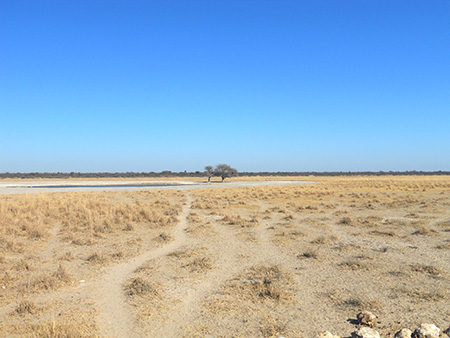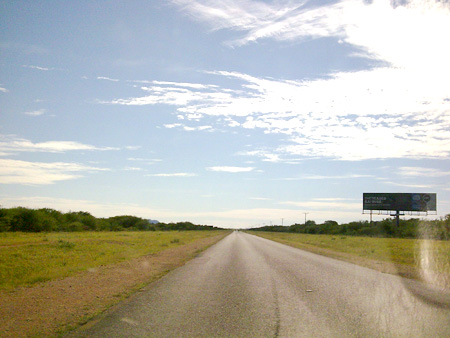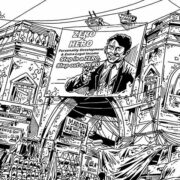The first thing you notice is the stillness in the air. Everything slows down to a stop. The wind just hangs mid-air and engulfs you in this unusual silence—something very atypical to most international airports.
Not many passengers arriving in Gaborone, Botswana, today. Or any other day,
I am told.

The Great Thirst. Photograph by Isabella Ricci.
The propellers of the twin engine aircraft slowly twirl to a halt, and the exit doors open to a fiery lash of hot air. There were less than 15 people on board, and it took an odd 35-minute flight from Johannesburg, South Africa, to get here. I didn’t even get to finish my sandwich.
The luggage carrier rolled up in front of us as we trudged along on to the burning concrete tarmac. The short walk from the plane to the airport building takes less than five minutes, but the heat weighs you down, and placing one foot in front of the other seems like a challenge. The sun is relentless in here—harsh and dry. You don’t sweat in Gaborone during the summer—all bodily moisture vaporises almost instantly. Instead, your skin burns—it crackles, chafes, and flakes off—slowly and painfully. The arid winds of the Kalahari salt pans fly east, towards the still-developing-into-a-city capital of the south African country of two million, and scrape your skin like sawdust. It’s no wonder then, that the great Kalahari Desert that covers about seventy per cent of the country derives its name from the African name for “the great thirst.” And this thirst leaves you constantly parched.
The rest of Botswana is slowly waking up to the concept of an urban landscape; currently devoid of any vertical development or hasty globalisation. The biggest city, Gaborone, is yet to get its twinkling city lights, sprawling sky scrapers and rush hour traffic. But it is the capital. The hub of all activity—or the lack thereof: in Botswana, you learn to “hurry up, slowly”.
When I first got here, which was quite the adventure in itself, I found the place extremely bizarre and surreal. For starters, it was so calm. As someone born and bred in cities, used to the fast pace of a demanding 24×7 job, a hectic social life and a very action-packed day, I found their unperturbed lack of urgency and laid back lifestyle quite unnerving.
“You’re here to relax, stop complaining,” my mother said. And that was true—I should be thankful for all the free time I had. But I had to do something to relax, right? So I went for a safari. Into the Bush.
The Bush trails in Botswana are famous for giving an insight into how our ancestors must have lived, thousands of years ago. The Bushmen are basically a nomadic clan that still continues to live, and thrive, in the wilderness of the savannah. Despite living in conditions that would ordinarily be considered “deprived”, the Bushmen tribes shun modern living, and continue live with almost minimal interaction with the outside world. Most importantly, they prioritise their day in order to keep maximum time for leisure—embodying the true spirit of Botswana.

The city road. Photograph by Isabella Ricci.
This same attitude has also seeped into the cities. Shops here close at seven p.m., there are no newspapers on the weekends, hospital staff is reduced to less than ten per cent during the holidays, and everyone is constantly counting down to the time when they can leave offices and head to the nearest pub. Botswana is also perhaps one of the only places in the world to not crumble and fall in case 90 per cent of the country suffers from a four-day long network blackout. Remember the R.I.M. shut down that stopped B.B.M. services for two days and the company had to publicly apologise several times for the inconvenience? Nah, not here in Botswana. People here simply came to work as usual, but played solitaire for a few hours, took breaks for their second breakfast, elevensies, afternoon tea, etc., chatted about the President’s new girlfriend, and went back home without having made a single transaction. “Why are you always so worried? We’ll work when the Internet comes back,” one co-worker said. He didn’t know I was trying to email my first ever submission to an alternative online magazine. He was too busy planning what to wear for his Friday night “Sheesha Party on a Hill”.
The people here live for today: never saving for a rainy day, not giving a care to life insurance policies, not bothering to officially get married and settle down and buy property. They seem to be carefree and relaxed, almost to the point of callousness. Where else will you find people who, on a regular basis, spend their entire month’s salary in one shopping spree?
At first look, it is easy to dismiss their attitude as sluggish, devoid of any ambition or desire for progress. But the longer you stay here, the more you realise how far from the truth this is—the locals are the way they are because of a very dismal state of affairs that they have to face everyday. More than a quarter of its two million population suffer from H.I.V. and A.I.D.S., which makes Botswana the second-worst country in the world to be hit by the deadly virus. Every fourth person you meet is counting down to the time they have left to live.
Along with the harsh climate and lack of proper health care, living to see your grandchildren is a rarity amongst the Batswana. Life expectancy fell to an all time low in the 2000s to an unbelievable 40 years of age, leaving over 120,000 children as orphans. When such statistics have been pre-determining your life and the lives of so many of your countrymen for decades, why would you waste your time with the banalities of a boring daily life?
Almost everyone eagerly waits for the weekends—Friday usually becomes a half-day as people get tried of waiting and “knock off” early. Weekends are a riot in Gaborone—quite literally. On an average the city sees 12-15 fatal road accidents every weekend. In almost every corner of the city, any place with a roof has the potential to become party central. Jazz and traditional folk music dominate the sound waves here, with their traditional beer, Chibuku, acting as a social lubricant.
When fighting against forces much greater than yourself, and so much beyond your control, there’s only two ways to go about things—wallow in self-pity, or live every day like it’s your last.
The Batswana have chosen the later. And that’s enough of a reason to always be in the mood to party.









Such a well-written travelogue! “For starters, it was so calm.” I think bred in the confusion of cities, it does take time to acclimatize to a slower pace.
Looking forward to more :)
And yes, Dorian Gray and postcards! Yay for them :)